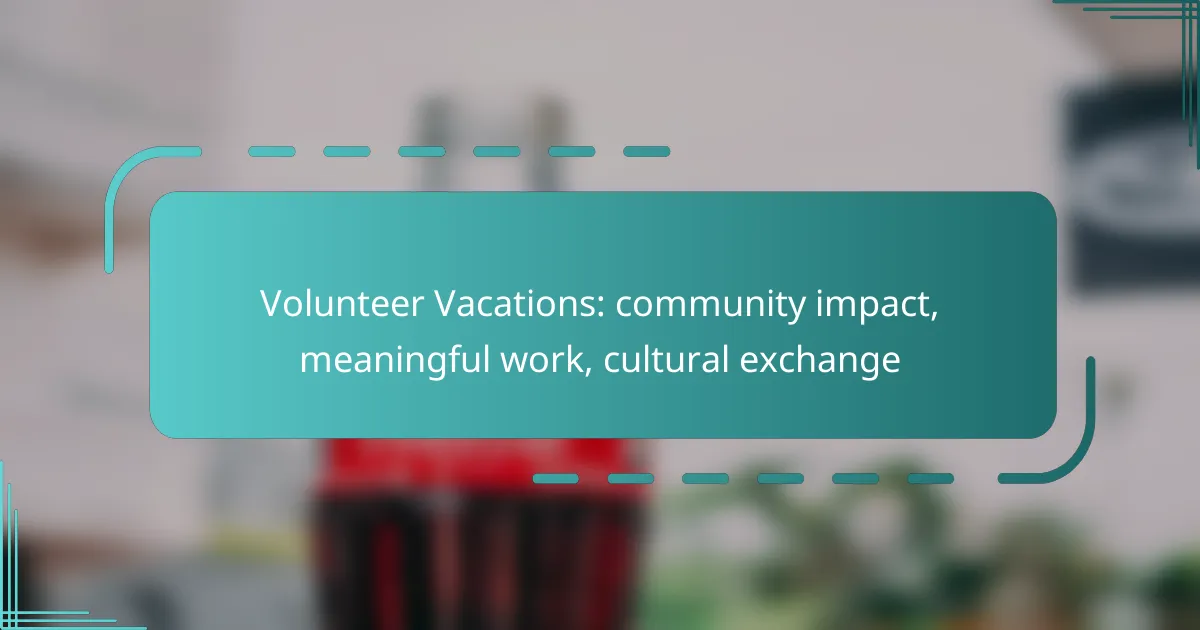Volunteer vacations offer a unique opportunity to make a meaningful impact while immersing oneself in diverse cultures. By participating in projects such as conservation, education, or healthcare, volunteers not only support local communities but also foster connections that enrich both their lives and those they assist. Careful selection of a program that aligns with personal interests and values enhances the overall experience and effectiveness of the contribution.
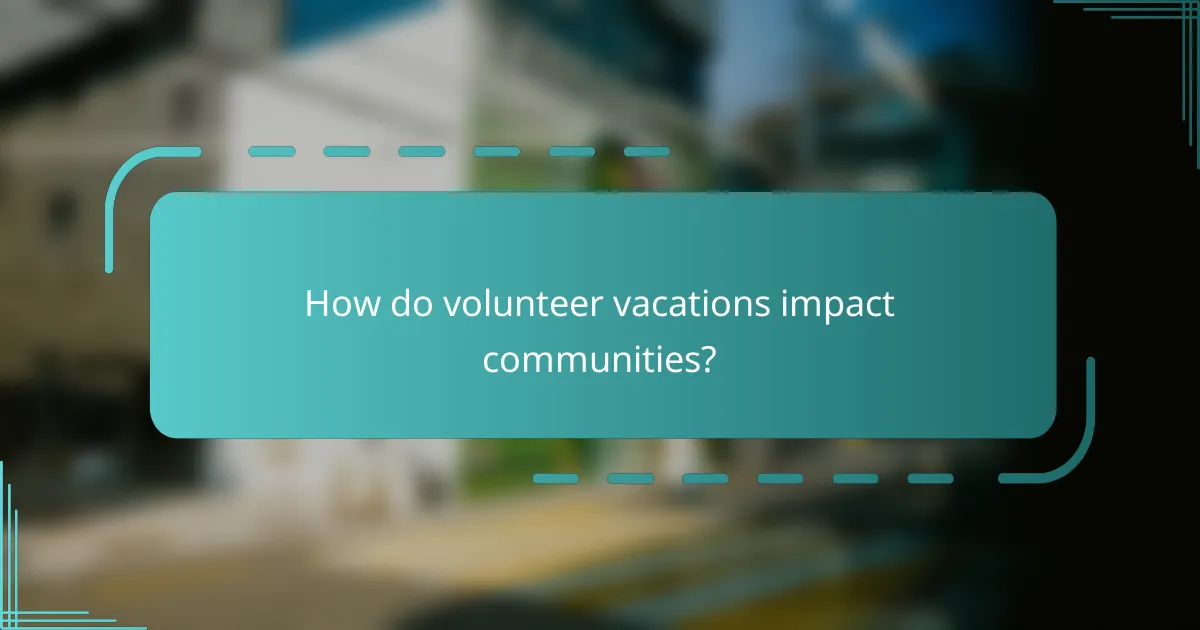
How do volunteer vacations impact communities?
Volunteer vacations significantly impact communities by providing essential support and fostering connections between volunteers and local residents. These experiences often lead to lasting improvements in social structures, economic conditions, and environmental health.
Positive social change
Volunteer vacations can drive positive social change by addressing community needs and promoting inclusivity. Volunteers often work on projects that empower marginalized groups, enhance education, or improve healthcare access.
For instance, programs focused on education may involve teaching English or providing tutoring services, which can lead to better job opportunities for local residents. This exchange fosters mutual understanding and respect, creating a more cohesive community.
Economic benefits
Volunteer vacations contribute to economic benefits by injecting funds into local economies and creating job opportunities. When volunteers participate in projects, they often spend money on lodging, food, and local services, which stimulates business growth.
Additionally, projects that improve infrastructure, such as building schools or clinics, can lead to long-term economic development. Communities may see increased tourism as a result of enhanced facilities, which can further bolster local income.
Environmental restoration
Volunteer vacations play a crucial role in environmental restoration by engaging participants in conservation efforts. Volunteers may participate in activities like tree planting, wildlife rehabilitation, or beach clean-ups, which help restore natural habitats.
These initiatives not only improve local ecosystems but also raise awareness about environmental issues among volunteers and community members. By working together, volunteers and locals can develop sustainable practices that benefit the environment in the long run.
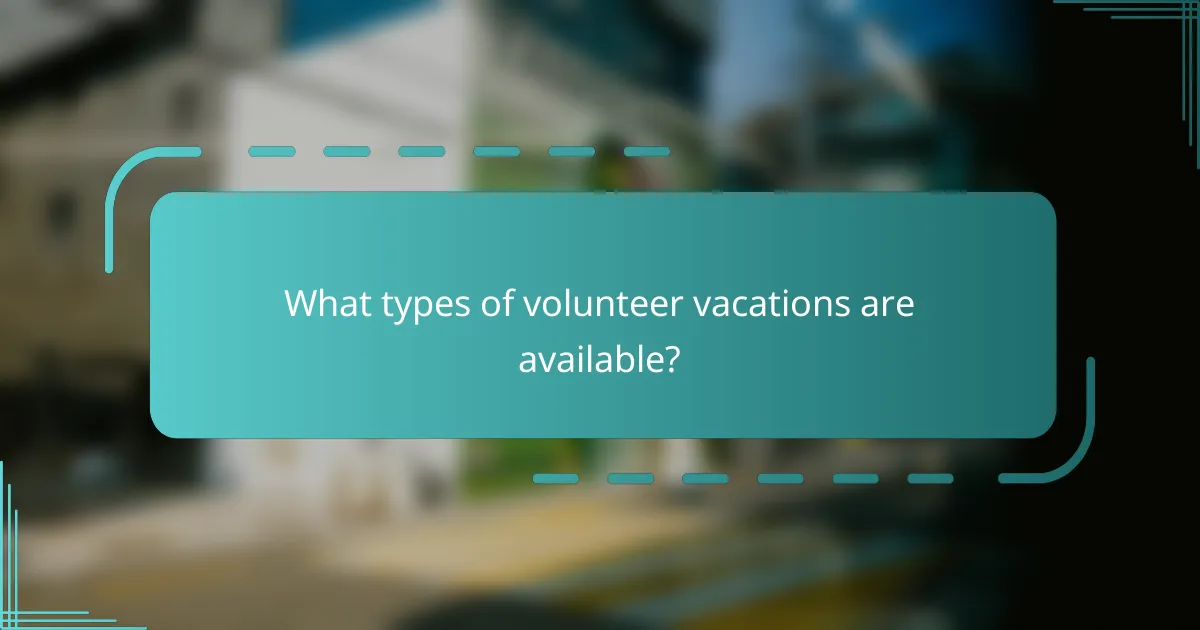
What types of volunteer vacations are available?
Volunteer vacations encompass a variety of opportunities that allow individuals to contribute to communities while experiencing different cultures. Common types include conservation projects, teaching programs, and healthcare initiatives, each offering unique ways to make a positive impact.
Conservation projects
Conservation projects focus on protecting natural resources and wildlife, often in areas facing environmental challenges. Volunteers may engage in activities such as reforestation, wildlife monitoring, or habitat restoration. These projects are typically located in biodiverse regions, such as rainforests or marine environments.
When considering a conservation project, evaluate the specific environmental issues being addressed and the skills required. Some programs may require physical labor, while others might involve research or community education. It’s essential to choose a project that aligns with your interests and abilities.
Teaching and education programs
Teaching and education programs allow volunteers to support local schools and educational initiatives, often in underserved communities. Volunteers may teach English, assist with literacy programs, or provide vocational training. These programs can be found in various countries, particularly in developing regions.
Before committing, assess the local educational needs and the age group you will be working with. Some programs may require teaching qualifications or experience, while others welcome individuals with a passion for education. Engaging with local teachers can enhance the effectiveness of your efforts.
Healthcare initiatives
Healthcare initiatives focus on improving health services and education in communities with limited access to medical care. Volunteers may participate in health education campaigns, assist in clinics, or support public health projects. These initiatives are often found in low-income areas where healthcare resources are scarce.
When choosing a healthcare initiative, consider your qualifications and the specific health issues prevalent in the region. Some programs may require medical training or certifications, while others may be open to those with a general interest in health advocacy. Collaborating with local healthcare professionals can maximize your impact.

How to choose the right volunteer vacation?
Choosing the right volunteer vacation involves aligning your personal interests with the mission of the organization, ensuring its credibility, and considering the cultural context of the location. This thoughtful approach maximizes both your impact and personal fulfillment during the experience.
Assess personal interests
Start by identifying what causes resonate with you, such as education, environmental conservation, or healthcare. Reflect on your skills and how they can contribute to these areas; for example, teaching English or assisting in wildlife rehabilitation.
Make a list of your top interests and compare them with available volunteer programs. This will help you find opportunities that not only match your passions but also allow you to make a meaningful impact.
Evaluate organization credibility
Research the organizations you’re considering by checking their track record, reviews, and transparency about their projects. Look for testimonials from past volunteers and verify if they have any certifications or affiliations with reputable networks.
Be cautious of organizations that require high fees without clear explanations of how funds are used. A credible organization should provide detailed information about their projects, including the expected outcomes and how volunteers contribute to these goals.
Consider location and culture
Choosing the right location involves understanding the cultural dynamics and social issues of the area. Research the local customs, language, and community needs to ensure your presence is respectful and beneficial.
Consider factors such as safety, climate, and accessibility when selecting a destination. For instance, volunteering in rural areas may offer a more immersive cultural experience, while urban settings might provide more resources and support.
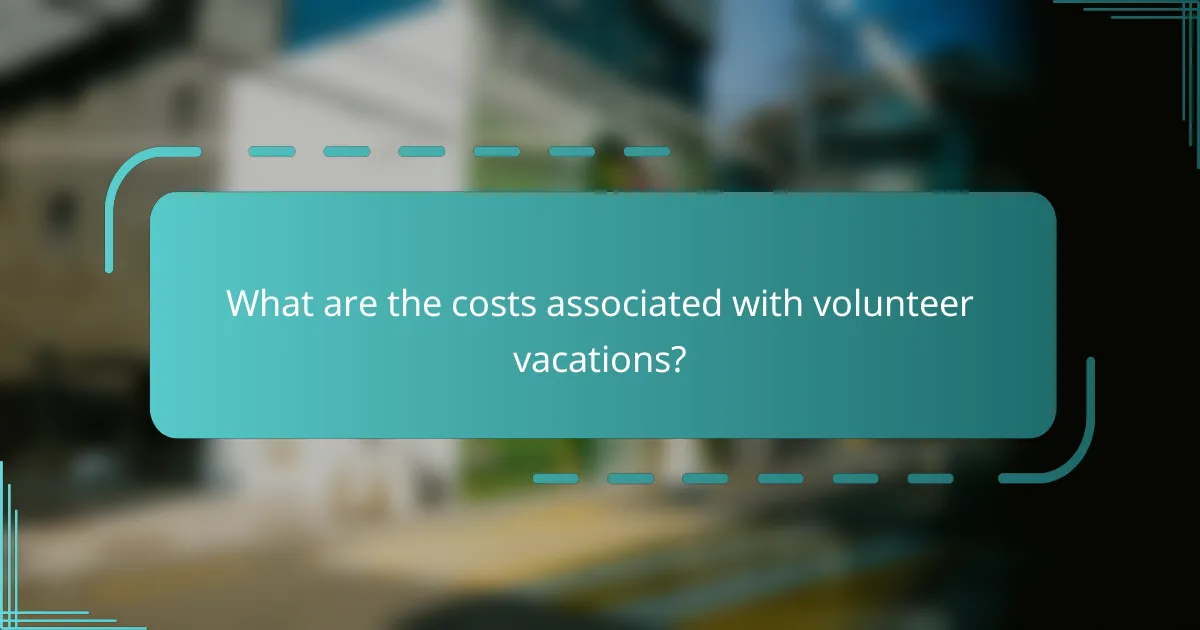
What are the costs associated with volunteer vacations?
Volunteer vacations can involve various costs, including program fees, travel expenses, and accommodation costs. Understanding these expenses is crucial for budgeting and ensuring a meaningful experience without financial surprises.
Program fees
Program fees typically cover the administrative costs of the volunteer organization, training, and support services. These fees can range from a few hundred to several thousand dollars, depending on the program’s length and location.
When evaluating program fees, consider what is included. Some programs may offer meals, transportation, or cultural activities as part of their package, which can enhance the overall experience.
Travel expenses
Travel expenses encompass flights, local transportation, and any necessary visas. International flights can vary significantly in price, often ranging from a few hundred to over a thousand dollars, depending on the destination and time of booking.
Be sure to account for local transportation costs as well. Depending on the location, you might need to budget for buses, taxis, or even rental cars to reach your volunteer site.
Accommodation costs
Accommodation costs can vary widely based on the type of lodging provided. Some volunteer programs include housing in their fees, while others may require you to find your own accommodations, which can range from budget hostels to more comfortable hotels.
When assessing accommodation options, consider the amenities and proximity to your volunteer site. Staying closer may save time and transportation costs, while more affordable options could help you stick to your budget.
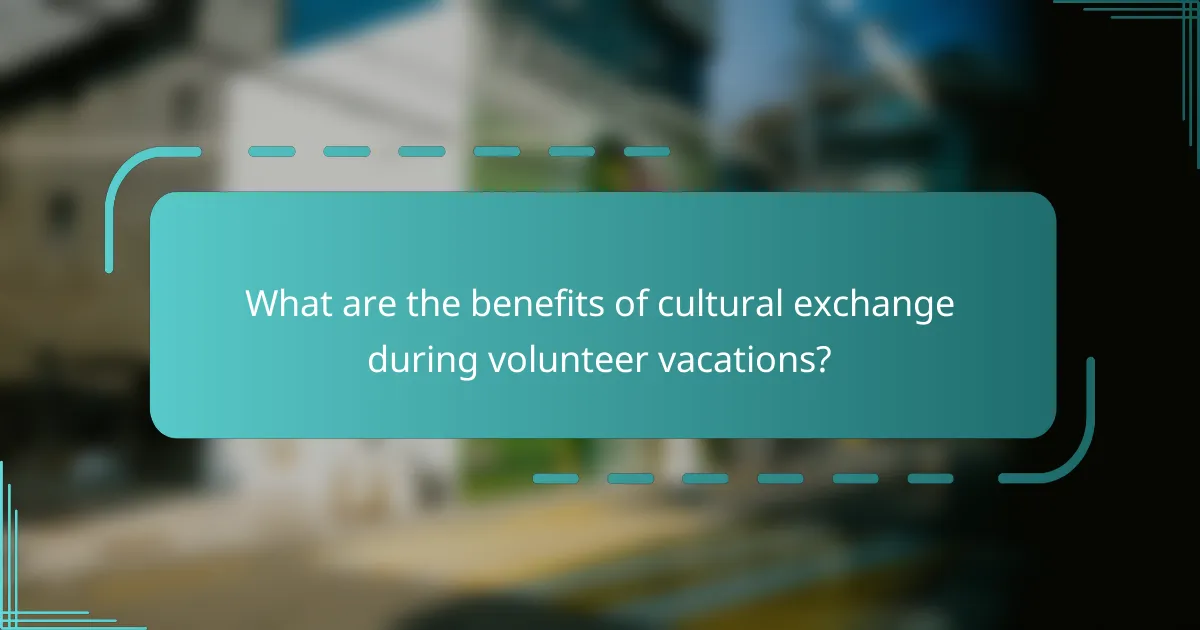
What are the benefits of cultural exchange during volunteer vacations?
Cultural exchange during volunteer vacations offers significant benefits, including enhanced understanding of diverse cultures, improved language skills, and the opportunity to build global networks. Engaging with local communities fosters meaningful connections and enriches the volunteer experience.
Enhanced cultural understanding
Enhanced cultural understanding occurs when volunteers immerse themselves in new environments and interact with local communities. This exposure helps individuals appreciate different customs, traditions, and perspectives, leading to greater empathy and respect for diversity.
Volunteers often participate in community projects that reflect local values and practices, which can challenge preconceived notions and broaden worldviews. For instance, working alongside locals in agricultural projects can reveal the importance of sustainable practices unique to that region.
Language skills development
Language skills development is a natural outcome of cultural exchange during volunteer vacations. Volunteers frequently engage in conversations with local residents, which provides practical opportunities to practice speaking and listening in a new language.
Even basic interactions, such as asking for directions or ordering food, can significantly enhance language proficiency. Many programs also offer language classes or workshops, allowing volunteers to gain structured learning alongside real-life practice.
Building global networks
Building global networks is a key advantage of participating in volunteer vacations. Volunteers connect with fellow travelers and locals, creating relationships that can lead to future collaborations or friendships across borders.
These networks often extend beyond the duration of the trip, providing ongoing support and resources. For example, a volunteer may stay in touch with a local organization, leading to potential job opportunities or further volunteer projects in the future.
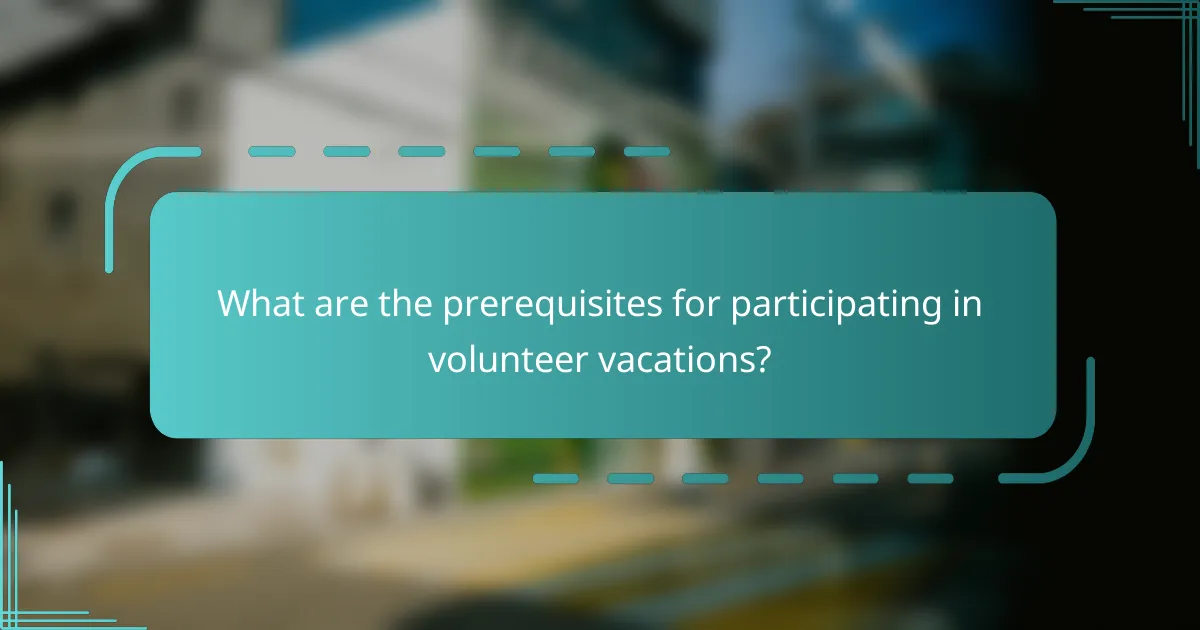
What are the prerequisites for participating in volunteer vacations?
To participate in volunteer vacations, individuals typically need to meet certain health, safety, and logistical requirements. These prerequisites can vary by program and destination, so it’s essential to research specific opportunities before committing.
Health and safety requirements
Health and safety requirements for volunteer vacations often include vaccinations, health insurance, and sometimes a medical examination. Common vaccinations may include those for hepatitis A and B, typhoid, and tetanus, depending on the region where you will be volunteering.
Additionally, many programs require proof of travel insurance that covers health emergencies, including evacuation. It’s advisable to check if the insurance covers specific activities you may engage in during your volunteer work.
Lastly, participants should be aware of local health advisories and safety regulations. For example, some areas may have specific guidelines regarding COVID-19 or other health risks, which can affect your travel plans and participation in volunteer activities.
